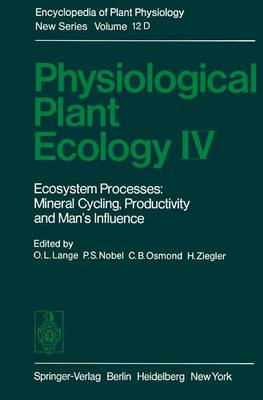O. L. LANGE, P. S. NOBEL, C. B. OSMOND, and H. ZIEGLER In the last volume of the series 'Physiological Plant Ecology' we have asked contributors to address the bases of ecosystem processes in terms of key plant physiological properties. It has often been suggested that it is not profitable to attempt analysis of complex living systems in terms of the properties of component individuals or populations, i. e. , the whole is more than the sum of its parts. Nevertheless, assessments of ecological research over the last century show that other approaches are seldom more helpful. Although it is possible to describe complex systems of living organisms in holistic terms, the most useful descriptions are found in terms of the birth, growth and death of individ uals. This allows analysis of performance of the parts of the whole considering their synergistic and antagonistic interrelationships and is the basis for a synthe sis which elucidates the specific properties of a system. Thus it seemsthat the description of ecosystem processes is inevitably anchored in physiological under standing. If enquiry into complex living systems is to remain a scientific exercise, it must retain tangible links with physiology. Of course, as was emphasized in Vol. 12A, not all of our physiological understanding is required to explore ecosystem processes. For pragmatic purposes, the whole may be adequantely represented as a good deal less than the sum of its parts.
- ISBN13 9783642681585
- Publish Date 19 November 2011 (first published 1 September 1983)
- Publish Status Active
- Publish Country DE
- Publisher Springer-Verlag Berlin and Heidelberg GmbH & Co. KG
- Imprint Springer-Verlag Berlin and Heidelberg GmbH & Co. K
- Edition Softcover reprint of the original 1st ed. 1983
- Format Paperback
- Pages 646
- Language English
